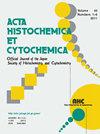Immunolocalization of CD80 and CD86 in Non-Small Cell Lung Carcinoma: CD80 as a Potent Prognostic Factor
IF 1.8
4区 生物学
Q4 CELL BIOLOGY
引用次数: 3
Abstract
It has been demonstrated that tumor cells express programed cell death protein 1 (PD-L1) to escape T lymphocytes that express programed cell protein 1 (PD-1), and PD-1/PD-L1 immune checkpoint inhibitors have been regarded in lung cancer patients. CD80 and CD86 are members of B7 superfamily which regulates T lymphocyte activation and tolerance. However, immunolocalization of CD80 and CD86 has not been examined in the lung carcinoma tissues and their clinical significance remains unknown. Therefore, to clarify clinical significance of CD80 and CD86, we immunolocalized these in 75 non-small cell lung carcinomas (NSCLC) in this study. Immunoreactivities of CD80 and CD86 were mainly detected in tumor-infiltrating macrophages. Immunohistochemical CD80 status was high in 56% of NSCLC, and it was positively associated with stage, pathological T factor, distant metastasis, histological type and PD-L1 status. Moreover, multivariate analysis turned out that the CD80 status was an independent worse prognostic factor. CD86 status was high in 53% of the cases, but it was not significantly associated with any clinicopathological parameters. These findings suggest that CD80 is a potent worse prognostic factor possibly in association with escape from immune attack in NSCLC.CD80和CD86在非小细胞肺癌中的免疫定位:CD80是一个有效的预后因素
已经证明,肿瘤细胞表达程序性细胞死亡蛋白1(PD-L1)以逃避表达程序化细胞蛋白1(PD-1)的T淋巴细胞,并且PD-1/PD-L1免疫检查点抑制剂已被认为存在于癌症患者中。CD80和CD86是调节T淋巴细胞活化和耐受的B7超家族成员。然而,CD80和CD86的免疫定位尚未在肺癌组织中进行检测,其临床意义尚不清楚。因此,为了阐明CD80和CD86的临床意义,我们在本研究中对75例非小细胞肺癌(NSCLC)进行了免疫定位。CD80和CD86的免疫反应性主要在肿瘤浸润的巨噬细胞中检测到。免疫组织化学CD80在56%的NSCLC中高表达,并且与分期、病理T因子、远处转移、组织学类型和PD-L1状态呈正相关。此外,多变量分析表明,CD80状态是一个独立的预后较差的因素。53%的病例中CD86状态较高,但与任何临床病理参数均无显著相关性。这些发现表明,CD80是一种潜在的更差预后因素,可能与NSCLC免疫攻击的逃避有关。
本文章由计算机程序翻译,如有差异,请以英文原文为准。
求助全文
约1分钟内获得全文
求助全文
来源期刊

Acta Histochemica Et Cytochemica
生物-细胞生物学
CiteScore
3.50
自引率
8.30%
发文量
17
审稿时长
>12 weeks
期刊介绍:
Acta Histochemica et Cytochemica is the official online journal of the Japan Society of Histochemistry and Cytochemistry. It is intended primarily for rapid publication of concise, original articles in the fields of histochemistry and cytochemistry. Manuscripts oriented towards methodological subjects that contain significant technical advances in these fields are also welcome. Manuscripts in English are accepted from investigators in any country, whether or not they are members of the Japan Society of Histochemistry and Cytochemistry. Manuscripts should be original work that has not been previously published and is not being considered for publication elsewhere, with the exception of abstracts. Manuscripts with essentially the same content as a paper that has been published or accepted, or is under consideration for publication, will not be considered. All submitted papers will be peer-reviewed by at least two referees selected by an appropriate Associate Editor. Acceptance is based on scientific significance, originality, and clarity. When required, a revised manuscript should be submitted within 3 months, otherwise it will be considered to be a new submission. The Editor-in-Chief will make all final decisions regarding acceptance.
 求助内容:
求助内容: 应助结果提醒方式:
应助结果提醒方式:


